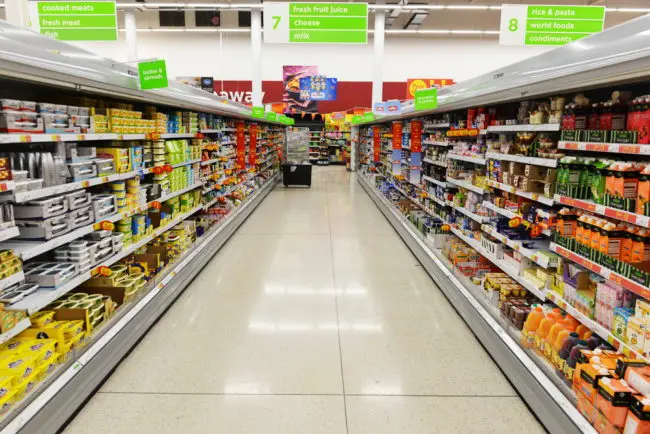A senior executive at a major food retailer has said it is considering introducing rationing to prevent firms that have not made their own no-deal Brexit plan from using food retailers as wholesalers.
But he said he did not envisage that the limits would affect normal retail customers.
“One potential problem is that businesses who are struggling with their supply chains effectively use ours,” he said.
“We would need to limit the amount restaurants or convenience stores, for example, that are short of stock could buy,” said the executive, who spoke to the BBC on condition of anonymity.
Not the first time
“We wouldn’t use the word rationing but that is effectively what it is. Limiting the volumes small businesses can purchase so that our retail customers get a chance to get what they need.”
Supermarkets already use rationing of sorts to limit the amount of items on special promotions people can buy.
No-deal Brexit rationing would work in a similar way – with the limits advertised on the shelf labels and enforced at the checkout.
Another boss, former Sainsbury’s chief executive Justin King, agreed that some bigger retailers would effectively become wholesalers as it has happened before.
Discounters are different
“It’s very likely that businesses will turn to supermarkets as they have the most sophisticated supply logistics. In previous weather related hold-ups or port blockades you have quite quickly seen smaller traders going to where the last stocks can be found.”
“No-one wants to use the r-word, rationing, but in a no deal scenario it will be inevitable. Suppliers are the ones who support and pay for promotions and they have access to point of sale data to make sure they are not being treated as wholesalers.”
The attitude is very different at discounters like Aldi and Lidl according to a former employee. For them, selling out of an item it is not a problem in the same way as the major supermarkets.
“You don’t lose points for selling out – in fact it enhances the “value” proposition to shoppers – this was such a good deal it’s now gone,” said the BBC’s discounter source. “The truth is, a lot of market traders, restaurants and convenience stores already use discount grocery retailers as wholesalers.”
‘Hard to pick worse date’
Food retailers say that a no-deal Brexit date of October 31st is much more challenging that the previous deadline of March 29th. Justin King said there were two reasons.
“First, retailers have started accumulating stock for Christmas, which means warehouses are full of frozen, chilled and ambient goods.
“Second, the beginning of autumn sees the UK much more reliant on overseas fresh produce.”
“Year-round we import nearly a third of our food from the EU. If you had to pick a time to leave the EU without a deal – it would be hard to pick a worse date than October 31”.
Recently leaked government no-deal preparation documents revealed that in a worst case scenario, flows of imports after three months could still be between 50-70% of current levels. Cabinet minister Michael Gove, who is in charge of planning for a no-deal scenario in exiting the EU, said this was a worst-case scenario and that Brexit planning had accelerated since Boris Johnson became PM.
The government has since tried to distance itself from this analysis describing it as out of date and irrelevant. Food retailers will be hoping they are correct – because according to Justin King, “if import levels are that low for that long we will have a major crisis”.
The Department for Environment, Food and Rural Affairs said: “We have a highly-resilient food supply chain and consumers in the UK have access to a range of sources of food. This will continue to be the case when we leave the EU on 31 October, whatever the circumstances.
“The food industry is well versed at dealing with scenarios that can affect food supply, from adverse weather damaging crops in other countries to transport issues abroad. The UK has robust supply chains across a range of countries to provide our food, in addition to the countless domestic food producers across the UK.”


